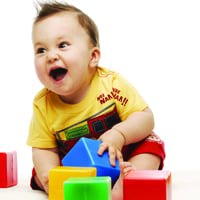Understanding Baby Milestones
How your baby develops from birth through preschool is remarkable. So many physical, cognitive and emotional changes will occur that experts have put them on a timeline to help parents and providers alike ensure baby is growing and developing appropriately. ‘Understanding Baby Milestones’ provides a general snapshot. No one knows your baby better than you—if you think your baby isn’t developing quite right, speak up! Your pediatrician can help you make decisions about testing or additional care so that baby develops the best way possible.
How Baby’s Brain Develops
Cognitive development is the cornerstone of intelligence, including memory, attention, problem-solving, and language skills. Alert your care provider if baby doesn’t meet these milestones:
| Cognitive Red Flags | Red Flags | |
| 2 months old | Doesn’t fixate on an object | |
| 4 months old | Doesn’t visually track an object | |
| 6 months old | Doesn’t turn toward sound/voice | |
| 9 months old | Doesn’t exhibit babbling of consonant sounds (da-da, ba-ba) | |
| 24 months old | Doesn’t use single words | |
| 36 months old | Doesn’t speak in 3-words sentences |
How Baby Learns to Move
Gross motor development means all movements—from the big ones like crawling and walking to fine motor skills involved with picking up small foods. Both gross and fine movement helps your baby balance, coordinate his body, and move with speed and strength to interact with his world. Where is your baby with the following motor milestones?
| Motor Red Flags | Red Flags |
| 4 months old | No steady head control while sitting |
| 9 months old | Unable to sit without support |
| 18 months old | Unable to walk independently |
ALSO READ: Mindful Diapering including Diaper Rash Care Guide
Baby Interacts with Her World
Your baby’s first social experience is bonding with you, and her first measurable social milestone is her smile. Three distinct emotions are present from birth: anger, joy, and fear.
By 2 years old she will begin to play with other children her own age. The rule of thumb is that your child can play effectively in groups of children equal to her age. For example, a 3-year-old child should play well with 2 other children.
| Social-Emotional Red Flags | Red Flags | |
| 6 months old | Doesn’t smile | |
| 9 months old | No vocalization(s) | |
| 12 months old | Doesn’t respond when his/her name is called | |
| 15 months old | Doesn’t point or make gestures | |
| 18 months old | Doesn’t exhibit simple pretend play | |
| Any age | Loss of previously acquired babbling, speech, or social skills |
In just a few short years, your child will grow from a completely dependent being into an independent individual with complex language and problem-solving skills who is able to interact positively and productively with others.
ALSO READ: Baby’s Milestones 0-4 months and Baby’s Milestones 4-8 Months
Did you know? At only 1 week old a baby can identify her mother by her smell.
Understanding Baby Milestones is one of a range of articles on Baby’s Milestones:
First Words: Better Baby Babble
Tips On Dealing With Baby’s Teething
Deciphering Baby Talk: What is Your Baby Saying






Comments are closed.